英国百年战争英文介绍
- 格式:pptx
- 大小:2.23 MB
- 文档页数:9
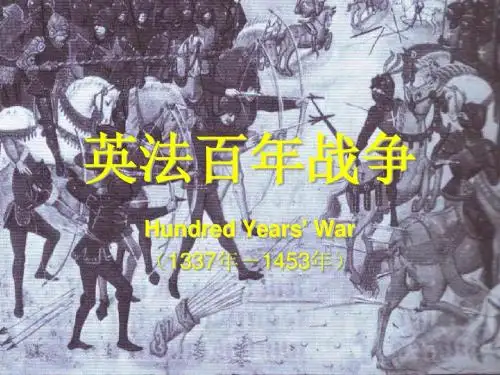
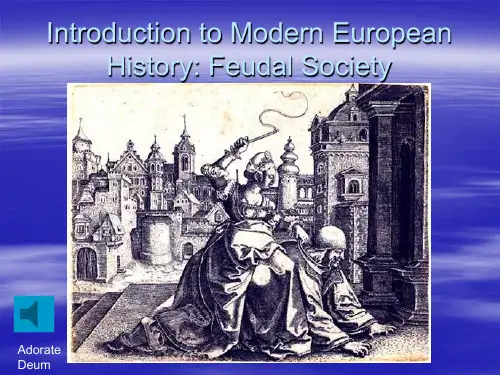
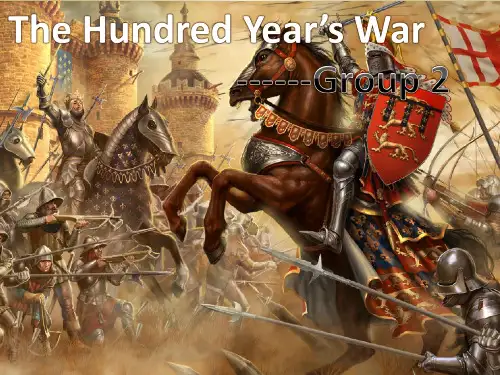
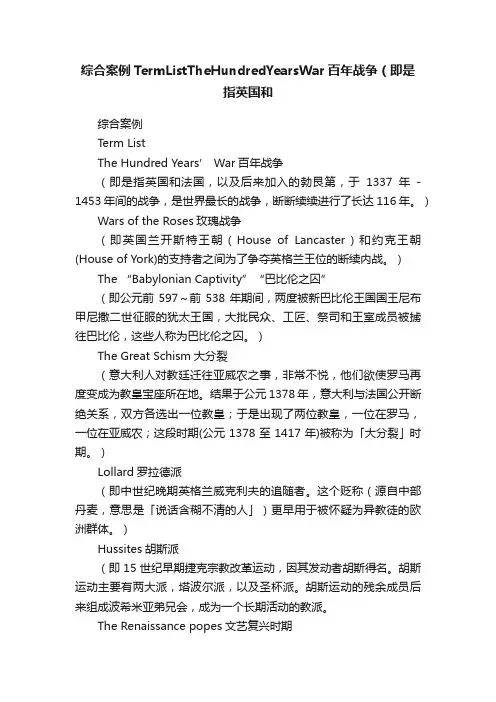
综合案例TermListTheHundredYearsWar百年战争(即是指英国和综合案例Term ListThe Hundred Years’ War百年战争(即是指英国和法国,以及后来加入的勃艮第,于1337年- 1453年间的战争,是世界最长的战争,断断续续进行了长达116年。
)Wars of the Roses玫瑰战争(即英国兰开斯特王朝(House of Lancaster)和约克王朝(House of York)的支持者之间为了争夺英格兰王位的断续内战。
)The “Babylonian Captivity”“巴比伦之囚”(即公元前597~前538年期间,两度被新巴比伦王国国王尼布甲尼撒二世征服的犹太王国,大批民众、工匠、祭司和王室成员被掳往巴比伦,这些人称为巴比伦之囚。
)The Great Schism大分裂(意大利人对教廷迁往亚威农之事,非常不悦,他们欲使罗马再度变成为教皇宝座所在地。
结果于公元1378年,意大利与法国公开断绝关系,双方各选出一位教皇;于是出现了两位教皇,一位在罗马,一位在亚威农;这段时期(公元1378至1417年)被称为「大分裂」时期。
)Lollard罗拉德派(即中世纪晚期英格兰威克利夫的追随者。
这个贬称(源自中部丹麦,意思是「说话含糊不清的人」)更早用于被怀疑为异教徒的欧洲群体。
)Hussites胡斯派(即15世纪早期捷克宗教改革运动,因其发动者胡斯得名。
胡斯运动主要有两大派,塔波尔派,以及圣杯派。
胡斯运动的残余成员后来组成波希米亚弟兄会,成为一个长期活动的教派。
The Renaissance popes文艺复兴时期(文艺复兴是指13世纪末在意大利各城市兴起,以后扩展到西欧各国,于16世纪在欧洲盛行的一场思想文化运动,带来一段科学与艺术革命时期,揭开了近代欧洲历史的序幕,被认为是中古时代和近代的分界。
)Austria18世纪初,哈布斯堡王朝领土空前扩大。
1815年维也纳会议后成立了以奥为首的德意志邦联,1866年在普奥战争中失败,邦联解散。
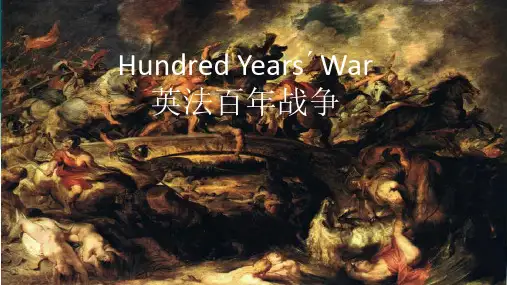
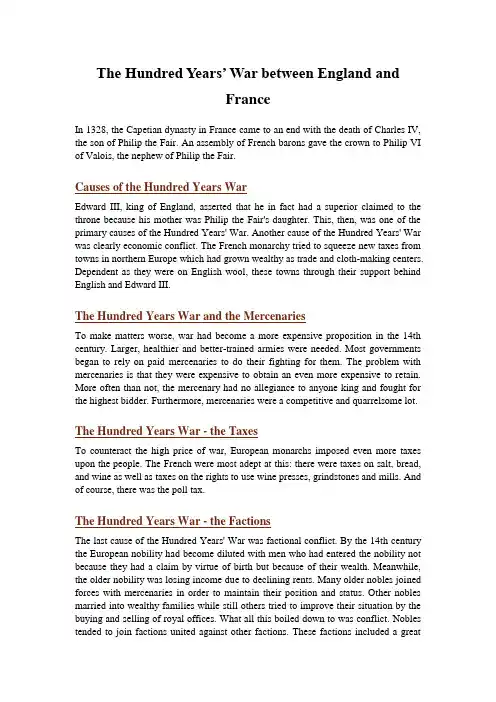
The Hundred Years’ War between England andFranceIn 1328, the Capetian dynasty in France came to an end with the death of Charles IV, the son of Philip the Fair. An assembly of French barons gave the crown to Philip VI of Valois, the nephew of Philip the Fair.Causes of the Hundred Years WarEdward III, king of England, asserted that he in fact had a superior claimed to the throne because his mother was Philip the Fair's daughter. This, then, was one of the primary causes of the Hundred Years' War. Another cause of the Hundred Years' War was clearly economic conflict. The French monarchy tried to squeeze new taxes from towns in northern Europe which had grown wealthy as trade and cloth-making centers. Dependent as they were on English wool, these towns through their support behind English and Edward III.The Hundred Years War and the MercenariesTo make matters worse, war had become a more expensive proposition in the 14th century. Larger, healthier and better-trained armies were needed. Most governments began to rely on paid mercenaries to do their fighting for them. The problem with mercenaries is that they were expensive to obtain an even more expensive to retain. More often than not, the mercenary had no allegiance to anyone king and fought for the highest bidder. Furthermore, mercenaries were a competitive and quarrelsome lot. The Hundred Years War - the TaxesTo counteract the high price of war, European monarchs imposed even more taxes upon the people. The French were most adept at this: there were taxes on salt, bread, and wine as well as taxes on the rights to use wine presses, grindstones and mills. And of course, there was the poll tax.The Hundred Years War - the FactionsThe last cause of the Hundred Years' War was factional conflict. By the 14th century the European nobility had become diluted with men who had entered the nobility not because they had a claim by virtue of birth but because of their wealth. Meanwhile, the older nobility was losing income due to declining rents. Many older nobles joined forces with mercenaries in order to maintain their position and status. Other nobles married into wealthy families while still others tried to improve their situation by the buying and selling of royal offices. What all this boiled down to was conflict. Nobles tended to join factions united against other factions. These factions included a greatfamily, their knights, servants and even workers and peasants on the manorial estate. They had their own small armies, loyalties and even symbols of allegiance. The bottom line is that these factions were beginning to form small states within a state and contributed not only to the overall violence of the 14th century but also to the need of monarchs to keep their nobility under constant surveillance. This explains why Louis XIV, the Sun King, housed his nobility at Versailles -- it was so he could keep an eye on them.The Hundred Years War - AquitaineThe most pressing issue during the Hundred Years' War was the status of Aquitaine, a large province in south western France. According to feudal law, Edward III held Aquitaine as part of his fiefdom. Philip attacked this territory, claiming it was rightfully his. Edward's response was to join forces with the Flemish in 1337 and this was the principal cause of the war.The Hundred Years WarThe war, fought entirely on French soil, raged off and on for more than 100 years. English victories were followed by French victories, then a period of stalemate would ensue, until the conflicts again rose to the surface. During periods of truce, English and French soldiers -- most of whom were mercenaries -- would roam the French countryside killing and stealing. After the battle of Agincourt in 1415, won by the English under Henry V, the English controlled most of northern France. It appeared that England would shortly conquer France and unite the two countries under one crown. At this crucial moment in French history, a young and illiterate peasant girl, Joan of Arc (c.1412-1431), helped to rescue France.The One Hundred Years War and Joan of ArcAt the age of 13 Joan believed she had heard the voices of St. Michael, St. Catherine and St. Margaret bidding her to rescue the French people. Believing that God had commanded her to drive the English out of France, Joan rallied the demoralized French troops, leading them in battle. Clad in a suit of white armor and flying her own standard she liberated France from the English at the battle of Orleans. Ultimately captured and imprisoned by the English, Joan of Arc was condemned as a heretic and a witch and stood trial before the Inquisition in 1431. Joan was found guilty and was to be burnt at the stake but at the last moment she broke down and recanted everything. She eventually broke down again and faithful to her "voices," decided to become a martyr and was then burnt at the stake and became a national hero.。
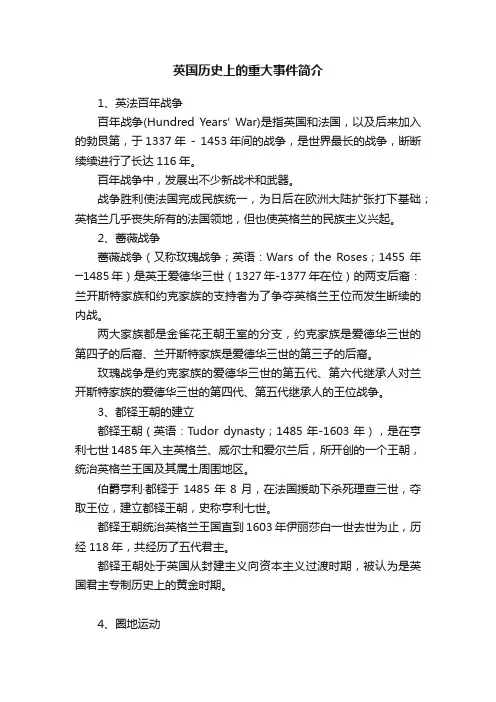
英国历史上的重大事件简介1、英法百年战争百年战争(Hundred Years' War)是指英国和法国,以及后来加入的勃艮第,于1337年- 1453年间的战争,是世界最长的战争,断断续续进行了长达116年。
百年战争中,发展出不少新战术和武器。
战争胜利使法国完成民族统一,为日后在欧洲大陆扩张打下基础;英格兰几乎丧失所有的法国领地,但也使英格兰的民族主义兴起。
2、蔷薇战争蔷薇战争(又称玫瑰战争;英语:Wars of the Roses;1455年─1485年)是英王爱德华三世(1327年-1377年在位)的两支后裔:兰开斯特家族和约克家族的支持者为了争夺英格兰王位而发生断续的内战。
两大家族都是金雀花王朝王室的分支,约克家族是爱德华三世的第四子的后裔、兰开斯特家族是爱德华三世的第三子的后裔。
玫瑰战争是约克家族的爱德华三世的第五代、第六代继承人对兰开斯特家族的爱德华三世的第四代、第五代继承人的王位战争。
3、都铎王朝的建立都铎王朝(英语:Tudor dynasty;1485年-1603年),是在亨利七世1485年入主英格兰、威尔士和爱尔兰后,所开创的一个王朝,统治英格兰王国及其属土周围地区。
伯爵亨利·都铎于1485年8月,在法国援助下杀死理查三世,夺取王位,建立都铎王朝,史称亨利七世。
都铎王朝统治英格兰王国直到1603年伊丽莎白一世去世为止,历经118年,共经历了五代君主。
都铎王朝处于英国从封建主义向资本主义过渡时期,被认为是英国君主专制历史上的黄金时期。
4、圈地运动在14、15世纪农奴制解体过程中,英国新兴的资产阶级和新贵族通过暴力把农民从土地上赶走,强占农民份地及公有地,剥夺农民的土地使用权和所有权,限制或取消原有的共同耕地权和畜牧权,把强占的土地圈占起来,变成私有的大牧场、大农场。
这就是英国历史上的“圈地运动”。
在欧洲,英国的圈地运动最为典型,规模也最大。
封建制度时期,英国就已存在大规模圈地运动。
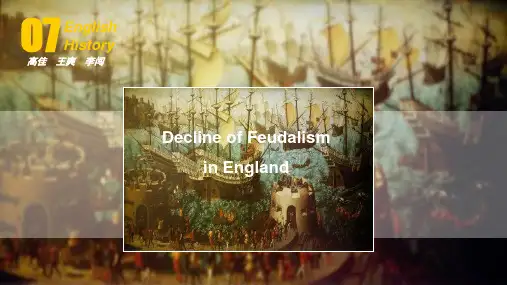
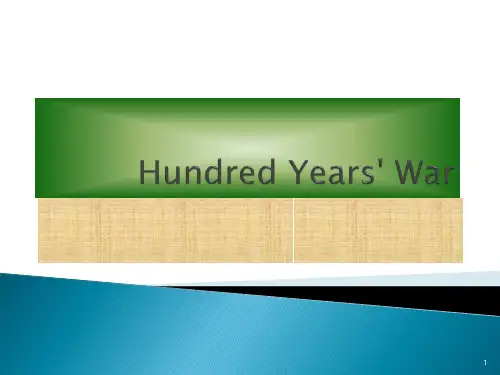
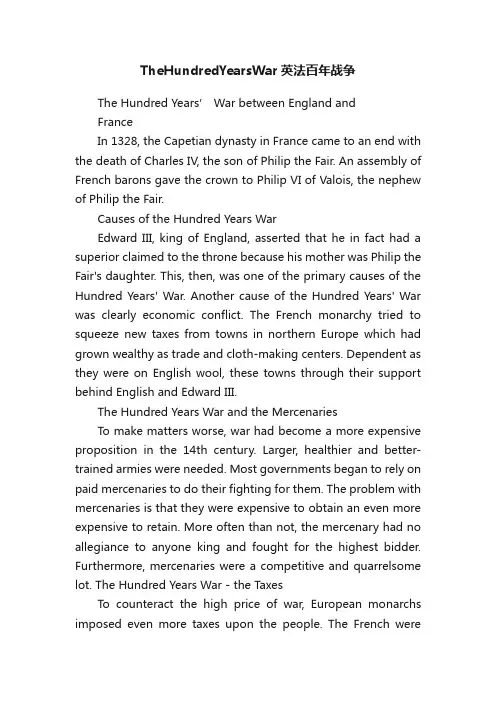
TheHundredYearsWar英法百年战争The Hundred Years’ War between England andFranceIn 1328, the Capetian dynasty in France came to an end with the death of Charles IV, the son of Philip the Fair. An assembly of French barons gave the crown to Philip VI of Valois, the nephew of Philip the Fair.Causes of the Hundred Years WarEdward III, king of England, asserted that he in fact had a superior claimed to the throne because his mother was Philip the Fair's daughter. This, then, was one of the primary causes of the Hundred Years' War. Another cause of the Hundred Years' War was clearly economic conflict. The French monarchy tried to squeeze new taxes from towns in northern Europe which had grown wealthy as trade and cloth-making centers. Dependent as they were on English wool, these towns through their support behind English and Edward III.The Hundred Years War and the MercenariesTo make matters worse, war had become a more expensive proposition in the 14th century. Larger, healthier and better-trained armies were needed. Most governments began to rely on paid mercenaries to do their fighting for them. The problem with mercenaries is that they were expensive to obtain an even more expensive to retain. More often than not, the mercenary had no allegiance to anyone king and fought for the highest bidder. Furthermore, mercenaries were a competitive and quarrelsome lot. The Hundred Years War - the TaxesTo counteract the high price of war, European monarchs imposed even more taxes upon the people. The French weremost adept at this: there were taxes on salt, bread, and wine as well as taxes on the rights to use wine presses, grindstones and mills. And of course, there was the poll tax.The Hundred Years War - the FactionsThe last cause of the Hundred Years' War was factional conflict. By the 14th century the European nobility had become diluted with men who had entered the nobility not because they had a claim by virtue of birth but because of their wealth. Meanwhile, the older nobility was losing income due to declining rents. Many older nobles joined forces with mercenaries in order to maintain their position and status. Other nobles married into wealthy families while still others tried to improve their situation by the buying and selling of royal offices. What all this boiled down to was conflict. Nobles tended to join factions united against other factions. These factions included a great family, their knights, servants and even workers and peasants on the manorial estate. They had their own small armies, loyalties and even symbols of allegiance. The bottom line is that these factions were beginning to form small states within a state and contributed not only to the overall violence of the 14th century but also to the need of monarchs to keep their nobility under constant surveillance. This explains why Louis XIV, the Sun King, housed his nobility at Versailles -- it was so he could keep an eye on them.The Hundred Years War - AquitaineThe most pressing issue during the Hundred Years' War was the status of Aquitaine, a large province in south western France. According to feudal law, Edward III held Aquitaine as part of his fiefdom. Philip attacked this territory, claiming it was rightfully his. Edward's response was to join forces with the Flemish in 1337and this was the principal cause of the war.The Hundred Years WarThe war, fought entirely on French soil, raged off and on for more than 100 years. English victories were followed by French victories, then a period of stalemate would ensue, until the conflicts again rose to the surface. During periods of truce, English and French soldiers -- most of whom were mercenaries -- would roam the French countryside killing and stealing. After the battle of Agincourt in 1415, won by the English under Henry V, the English controlled most of northern France. It appeared that England would shortly conquer France and unite the two countries under one crown. At this crucial moment in French history, a young and illiterate peasant girl, Joan of Arc (c.1412-1431), helped to rescue France.The One Hundred Years War and Joan of ArcAt the age of 13 Joan believed she had heard the voices of St. Michael, St. Catherine and St. Margaret bidding her to rescue the French people. Believing that God had commanded her to drive the English out of France, Joan rallied the demoralized French troops, leading them in battle. Clad in a suit of white armor and flying her own standard she liberated France from the English at the battle of Orleans. Ultimately captured and imprisoned by the English, Joan of Arc was condemned as a heretic and a witch and stood trial before the Inquisition in 1431. Joan was found guilty and was to be burnt at the stake but at the last moment she broke down and recanted everything. She eventually broke down again and faithful to her "voices," decided to become a martyr and was then burnt at the stake and became a national hero.。
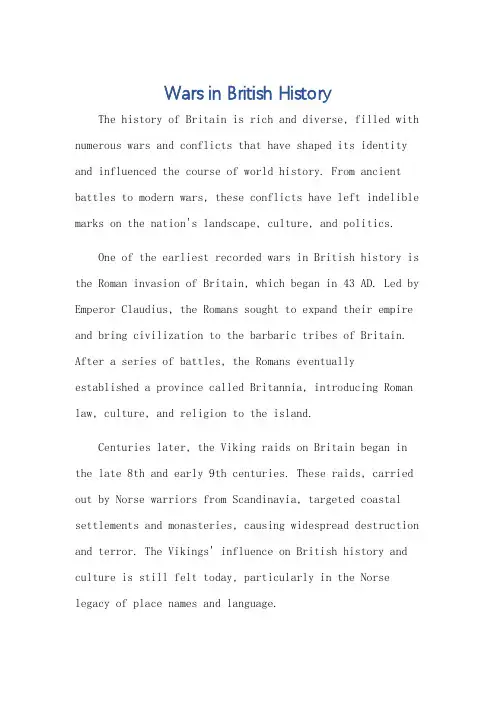
Wars in British HistoryThe history of Britain is rich and diverse, filled with numerous wars and conflicts that have shaped its identity and influenced the course of world history. From ancient battles to modern wars, these conflicts have left indelible marks on the nation's landscape, culture, and politics.One of the earliest recorded wars in British history is the Roman invasion of Britain, which began in 43 AD. Led by Emperor Claudius, the Romans sought to expand their empire and bring civilization to the barbaric tribes of Britain. After a series of battles, the Romans eventually established a province called Britannia, introducing Roman law, culture, and religion to the island.Centuries later, the Viking raids on Britain began in the late 8th and early 9th centuries. These raids, carried out by Norse warriors from Scandinavia, targeted coastal settlements and monasteries, causing widespread destruction and terror. The Vikings' influence on British history and culture is still felt today, particularly in the Norse legacy of place names and language.The Hundred Years' War between England and France, which spanned from 1337 to 1453, was a pivotal era in British military history. This conflict was primarily a struggle for territorial control in France, with England seeking to expand its influence and wealth throughterritorial conquests. The war saw some of the most famous battles in British history, including the Battle of Crécy and the Battle of Agincourt, both of which were significant victories for the English.The Tudor period marked a new era in British history, with the rise of powerful monarchs like Henry VIII and Elizabeth I. During this time, England was involved in several conflicts, including the War of the Roses, which was a civil war fought between rival noble families for control of the throne. The Tudor monarchs also faced external threats, such as the Spanish Armada, a fleet of ships sent by the Spanish king to invade England and overthrow the Protestant queen Elizabeth I.The Industrial Revolution brought about significant changes in British society and economy, but it also led to new conflicts. The Napoleonic Wars, fought between 1803 and1815, were a global conflict that saw Britain aligned with several European powers against the French Empire. These wars were significant for Britain's military and naval power, as well as its role in shaping the political landscape of Europe.The First and Second World Wars were two of the most devastating conflicts in British history. The First World War, fought from 1914 to 1918, saw Britain aligned with France and other nations against the Central Powers of Germany and Austria-Hungary. The war was devastating for Britain, causing significant casualties and economic strain. The Second World War, which began in 1939 and ended in 1945, was a global conflict that saw Britain, along with its allies, fight against the Axis powers led by Germany, Japan, and Italy. The war was a test of Britain's resilience and strength, and it ultimately led to the defeat of fascismand the establishment of a new global order.The wars and conflicts in British history have left a lasting impact on the nation's identity and place in the world. From the Roman invasion to the World Wars, these conflicts have shaped British culture, politics, andmilitary power. They have also demonstrated the resilience and courage of the British people in the face of adversity. As we look to the future, it is important to remember these wars and the lessons they have taught us about the importance of peace, cooperation, and the need to constantly strive for progress and improvement.**英国历史上的战争**英国的历史丰富多彩,充满了无数的战争与冲突,这些战争与冲突塑造了英国的身份,并影响了世界历史的进程。
百年战争引言Hundred Years' War是指英国和法国,以及后来加入的勃艮地,于1337年至1453年间的战争,是世界最长的战争,断断续续进行了长达116年。
14世纪,法国人试图把英国人赶出法国的西南部,从而统一法国。
英国当然不愿退出,并欲夺回祖先的土地如诺曼底、曼恩、安茹等。
当时英法两国因为贸易利益的关系,均对佛兰德斯做出争夺,使它们之间的冲突加深。
战争的导火线是英王爱德华三世乘法国卡佩王朝绝嗣之际,欲以近亲的关系继承法国王位,但最后却由腓力六世所获得,因此爱德华三世对法国宣战,以夺取法国王位。
当时神圣罗马帝国的诸侯和佛兰德斯站在英国一方,而苏格兰和罗马教皇则支持法国。
百年战争依局势的转变,大致可分为四个阶段。
The Hundred Years' War refers to the war Between Britain and France that lasted intermittently from 1337 to 1453, is the world's longest war. In 14th Century, in order to unify the French, the French tried to put the British out of southwestern France. The British certainly do not want to quit, and tried to regain their ancestral lands, such as Normandy, Anjou, Maine. At that time, Britain and France because of the relationship between trade interests, were made for Flanders, the conflict between them deepened. At that time, because of the relationship between trade interests, Britain and France were competing for Flanders, this makes the conflict between them deepened. War fuse is mainly the throne inheritance problem. In 1328, Charles IV died, the French capetian JueSi, branch African valois of Philip vi succession, whose king Charles IV to his nephew's qualifications, and Philip VI for the throne, triggering war. In accordance with changes in the situation, the hundred years' war can be roughly divided into four stages.1、第一阶段(1337年—1360年)是双方对佛兰德斯和基恩的争夺战。
hundred years war名词解释
百年战争是指发生在14世纪末至15世纪末的一系列英法之间的冲突。
它起因于英国国王爱德华三世对法国王位的要求,以及法国王位的继承权争议。
接着双方在欧洲各地进行了多次战役和冲突,其中包括众多著名的战役,如克雷西战役和阿金库尔战役。
百年战争结束于1453年,法国恢复了对英国在法国所占领土的控制。
百年战争对英法双方的政治、经济、军事和社会产生了重要影响,也标志着中世纪的结束和现代国际关系的开始。